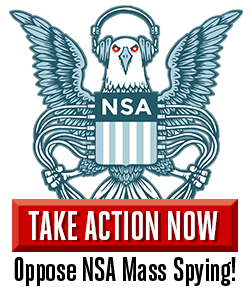Gestern berichteten wir über den USA Freedom Act:
Diese Woche entscheidet der US-Senat über die Zukunft des USA Freedom Act, ein Gesetzesvorschlag zur Beschränkung der Geheimdienst-Überwachung. Die EFF ruft Amerikaner dazu auf, ihre Abgeordneten zu kontaktieren, und den Freedom Act zu unterstützen. Andere kritisieren den Entwurf als zahnlos – oder Zementierung des Status Quo.
Doch nicht nicht einmal das kam durch. Erin Kelly schreibt auf USA Today:
The Senate on Tuesday failed to get the 60 votes needed to advance a bill that would stop the National Security Agency from collecting the phone records of millions of Americans who are not suspected of any crime.
Senators voted 58-42 in favor of a motion to allow the USA Freedom Act to come to an up or down vote in the Senate. The motion required 60 votes to pass.
The bill is effectively dead for this year and is unlikely to be revived when the new Congress convenes in January. However, the controversial NSA program will most likely be debated again next year as Congress decides whether to renew sections of the Patriot Act anti-terrorism law that are set to expire in June.
Die EFF kommentiert:
We are disappointed that the Senate has failed to advance the USA Freedom Act, a good start for bipartisan surveillance reform that should have passed the Senate.
The Senate still has the remainder of the current legislative session to pass the USA Freedom Act. We continue to urge the Senate to do so and only support amendments that will make it stronger. We strongly oppose any amendment that would water down the strong privacy, special advocate, and transparency provisions of the bill.
Vor der Abstimmung sorgte der Demokrat Harry Reid noch für Verwirrung, weil er eine Kriminalisierung von Online-Streams aus dem Stop Online Piracy Act (SOPA) in den USA Freedom Act aufnehmen wollte:
However, yesterday evening I heard through the grapevine that Reid also had a little „gift“ he was planning to add to the bill, and I’ve spent a big part of last night tracking down any details I could find. Basically, Reid wants to attach a part of SOPA to the bill: the felony streaming provisions. You may recall that this was the dangerous plan that was a part of SOPA and a companion to PIPA (though not directly in it) that would have turned merely streaming infringing works into a felony.





Hallo zusammen,
habt ihr euren Abgeordneten im Bundestag zur NSA/BND Affäre angeschrieben?
Meiner hült sich in schweigen. Schade, zu allem hat er eine Meinung nur dies ist Neuland für ihn.
Ist auch schon etwas älter.
Ich habe ihn auch darauf hingewiesen, dass das Schöne an der Überwachung ist, dass alle davon betroffen sind. Er, seine Familie, seine Freunde und Bekannten und wie er dies mit seinem Gewissen vereinbaren kann.
Macht es überhaupt Sinn dieses Gesetz zu verabschieden?
Meiner Ansicht nach muss das Internet zuerst dezentralisiert werden.
Warum?
Weil alle wichtigen Server und Behörden für weltweite Internetvewaltung wie beispielsweise „Internet Corporation for Assigned Names and Numbers (ICANN)“, (http://de.wikipedia.org/wiki/Internet_Corporation_for_Assigned_Names_and_Numbers#Kritik)
„IANA“ (http://de.wikipedia.org/wiki/IANA) und „National Telecommunications and Information Administration (NTIA)“
alle in US-Amerikansicher Hand sind. Selbst wenn man die Ausspähungen und ähnliche Praktiken der NSA oder GCHQ verbieten würde, wäre das Hauptproblem wie oben erwähnt nicht gelöst!
Die wichtigsten Internetbehörden sollten aber neutral sein und auch neutral durch Mitbestimmung und Mitspracherecht aller Staaten weltweit in UN Gremien verwaltet und gestaltet werden!
Gesetze wie Patriot Act und CISPA können jederzeit diese Behörden zur Herausgabe von Daten zwingen.